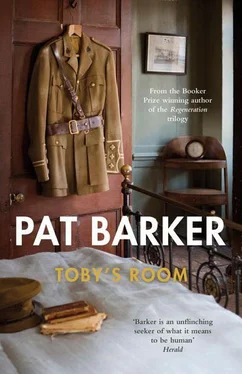Next morning, the train journey to Sidcup passed in almost total silence. Elinor gazed out of the window; Paul pretended to read. It seemed they were no longer even friends.
On Sidcup Station, a pretty young girl came up to Paul, holding her hand out, begging for cigarettes. When he gave her a packet of Woodbines, she said, ‘Gawd bless yer, guv,’ and bobbed a curtsy, before running back to her mother, a tall, angular woman with an imposing bosom, floor-length skirts and a wide-brimmed hat. She was one of three smartly dressed society ladies standing behind a trestle table collecting for the wounded soldiers at Queen’s Hospital. The young girl was managing to dart flirtatious glances at Paul behind her mother’s back.
Elinor looked exasperated. ‘If you’ve finished …’
‘Shall we get the tram?’ Paul said. ‘The porter said there’s one goes straight past the gates.’
‘No, let’s walk.’
He didn’t think she was up to it, but he was too tired to argue. At Charing Cross he’d exhausted his patience in a last-minute attempt to persuade her not to come at all. This unannounced visit to Neville was, at best, ill-judged; at worst, unfeeling, even cruel, but Paul was committed to seeing it through. So let her walk, if she wanted to. He didn’t care.
The road took them through the village and out into open country. Blue-painted benches were set at regular intervals along the grass verges. Hospital blue. Evidently the colour was intended as a warning: Don’t look this way, if you don’t want to see horrors. On one of these benches a soldier was sitting, wearing the red necktie and blue uniform of patients in military hospitals. Twenty yards or so ahead of Paul and Elinor, a dumpy little woman with a shopping bag was dragging a small child along by the hand. As soon as she saw the soldier the woman crossed, very obviously, to the other side of the road, but not all her care could prevent the child staring at the strange man on the bench. He smiled; the child screamed. Her mother bent down to smack the backs of her legs, and then yanked her — crying inconsolably — away. The soldier got stiffly to his feet and strode off down the road, back to the hospital grounds where he knew he would be safe.
The whole ugly little incident had taken no more than a minute, but it confirmed Paul in his view that they should not be here.
The hospital was approached by a long avenue of beech trees. Their dead leaves lay on the grass, reddish-brown, smelling pungently of decay. As a boy, he’d have been down on his knees scuffling through handfuls of mulch in search of stag beetles. Now, he limped soberly along, escorting a young lady, though they kept straggling apart, and not merely because of the uneven ground.
After a few minutes, the house came into view: a huge, mid-Victorian building with Italianate towers and turrets and a covering of ivy leaves that stirred as a breeze blew across the lawn. The front garden was set with beds of roses, many of the bushes still with lolling, loose-lipped blooms clinging to the stems. A solitary bee toppled from flower to flower.
Elinor was walking more slowly now. He suspected she was beginning to realize they might simply be turned away. He hoped they would. There was no sound except for their footsteps crunching over the beech mast in the drive. The silence was almost uncanny: it didn’t seem like a hospital at all. Only when they had opened the front door and stepped inside did they hear the sounds of a busy office: typewriters clattering, telephones ringing, the squeak of rubber-soled shoes on black-and-white tiles. A bowl of roses stood on a table by the door, much as it would have done when this was a private house, but the smell of boiled cabbage would not have been tolerated in any well-run home. It smelled like a boys’ school.
A secretary wearing a mannish tweed suit and rimless spectacles strode up to them. Paul explained their business.
‘Visiting’s Mondays at seven in the evening and Thursdays at two in the afternoon.’
‘We’ve come a long way,’ Elinor said.
The woman looked at her. ‘I’ll have to ask.’
She was gone some time, returning eventually with a nurse who rustled and crackled and asked about their relationship to Mr Neville, and when Paul admitted they were merely friends — close friends, Elinor put in — seemed equally unsure.
‘I’ll ask him if he wants to see you,’ she said. ‘Meanwhile you’d better wait in here.’
She opened a door into what might well have been a dentist’s waiting room. A round table covered with copies of Punch occupied the centre of the room. Elinor retreated to an armchair in the far corner; Paul went across to the window and looked out over the rear of the house. Once, all this land must have been set to lawns; now it was covered in row after row of huts. Some had narrow flower beds planted round them, but nothing could soften the brutal reality of raw, hastily erected wooden buildings crammed together in a waste of mud and trampled grass.
At the centre of the grid stood a black-and-white timbered building with a curious octagonal roof, designed, he supposed, to let in the maximum amount of light. As he watched, the doors of this building opened and a trolley emerged, pushed by a porter, with a nurse walking alongside, trying to steady some kind of apparatus that covered the patient’s nose and mouth. The trolley was wheeled rapidly along the covered path and through the doors of the next hut along. The journey had taken less than a minute.
Paul heard the creak of the door opening behind him. When he turned round, he saw that a man, not immediately recognizable as Neville, had come into the room.
‘Tarrant. This is a surprise.’
Something wrong about the voice; something terribly wrong. Pulling himself together, Paul went across and shook hands. ‘Sorry to hear about the …’ He was thinking: Don’t look away. Don’t stare .
‘Oh, there’s a lot worse than this. And let’s face it, Tarrant, I was always an ugly bugger. Your profile — now that would be a loss to mankind.’
His speech was very difficult to follow.
‘Sorry, I know I sound a bit odd. Like farting in soapy water, I’m afraid.’
Paul realized Neville didn’t know Elinor was there. She’d got to her feet and was standing motionless, arms hanging limp by her sides. Neville followed the direction of Paul’s gaze and took an involuntary step back.
Elinor came towards him. ‘Hello, Kit.’
She stretched out her hand. Neville took it as one might grasp a dead and decomposing fish. Then he retreated to an armchair as far away from her as possible and, even then, turned it a little to one side so the wing would cast a shadow over his face.
They sat down, their chairs forming an approximate triangle, and tried to think of things to say. Paul, who knew he had to take the lead, asked about Neville’s treatment.
‘They seem fairly optimistic. Gillies says a lot of damage was done by the surgery I had before I got here. You’re meant to come straight here but I ended up in the wrong hospital and they just stitched the edges together — so, apparently, the first thing is to undo all that. Gillies says it might look a bit worse, initially.’
Neville said this almost apologetically, as if well aware of their incredulity. Could anything be worse?
‘Odd chap, looks a bit like a bloodhound. New Zealander. He calls the patients “honey” and “my dear” and sits on the beds. God knows what the army make of him, but he’s supposed to be the best there is.’
Paul forced himself to ask about the food.
‘Not bad, actually, not bad at all. The hospital’s got its own farm so we get fresh milk, eggs … A lot of the chaps can’t eat solid food, so it’s eggnog, soup … Well, that’s it really. Food’s not as good for the men as it is for officers, of course.’ The red ruin turned in Paul’s direction. ‘Apparently, their delicate systems require more nourishment than ours.’
Читать дальше












